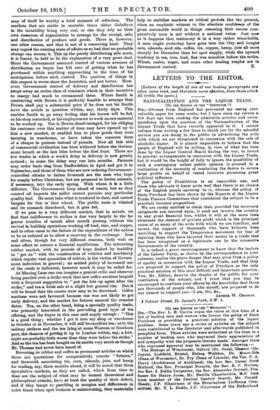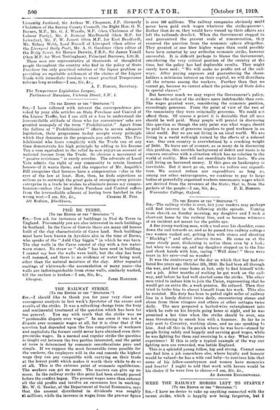LETTERS TO THE EDITOR.
[Letters of the length of one of our leading paragraphs are often nwre read, and therefore more effective, than those which fill treble the space.] NATIONALIZATION AND THE LIQUOR TRADE. (To Ms EDITOR 07 THE " SPECT1TOR."1 SIR,—Absence from England has prevented my seeing your valuable paper for some weeks, but I have since my return a few days ago been reading the admirable articles and correspondence upon the question of the Nationalization of the Liquor Trade that have recently appeared in it. I cannot refrain from writing a few lines to thank you for the splendid service you are doing to the public in advertising the evils with which we are threatened in connexion with the sale of alcoholic liquor. It is almost impossible to believe that the people of England will be willing, in view of what has been done by the Liquor Control Board during the war, to revert to pre-war arrangements in connexion with the Liquor Trade. but it would be the height of folly to ignore the possibility of such a contingency unless public opinion is aroused to a realization of the necessity of combating the desire to secure large profits on behalf of vested interests possessing great political influence.
The policy of Prohibition is an impossible one, and those who advocate it know quite well that there is no chance of the English people agreeing to it, whereas the policy of State Purchase has been shown by the Reports of the Liquor Trade Finance Committees that considered the subject to be a practical business proposition.
We are surely entitled to claim that, provided the necessary safeguards are insisted upon, it need not involve the country in any great financial loss, whilst it will at the same time eliminate the element of private profit which is the principal cause of so many of the evils with which we are familiar, and secure the support of thousands who have hitherto been unwilling to support the Temperance movement for fear of injuring those who have invested their money in a trade that has been recognized as a legitimate one by the successive Governments of the country.
It is indeed a great encouragement to know that the leaders of the Labour Party, as shown by the correspondence in your columns, realize the grave danger that may arise from a policy
of apathy in connexion with the Liquor Trade, and that they are prepared to support the policy of Purchase as the only practical solution of this most difficult and important question. You, Mr. Editor, deserve the thanks of the public for your ventilation of the subject, and I trust that you may be encouraged to continue your efforts by the knowledge that there are thousands of people who, like myself, are prepared to do our utmost to support you.—I am, Sir, die.,
ARTHUR W. CHAPMAN.
3 Palmer Street, St. James's Park, S.W. I.
(To THE EDITOR or THE " S7EGTATOR."1 Sra,—The Rev. L. B. Currie urges the value at this time of a list of leading men and women who favour the policy of State Purchase as providing a practical solution of the liquor problem. Some years ago a series of articles on the subject were contributed to the Spectator and afterwards published in pamphlet form. These articles were submitted at the time to a number of leading men who expressed their appreciation of and sympathy with the proposals therein made. Amongst those who expressed approval may be mentioned the following : The Bishops of Winchester, Oxford (Dr. (lore), Cheater (Dr. Jayne), Lichfield, Bristol, Bishop Wellckm, Dr. Moore-Ede (Dean of Worcester), Dr. Fry (Dean of Lincoln), the Yen. P. A. Derry (Archdeacon of Auckland), the late Rev. Canon Scott Holland, the Rev. Principal Forsyth, the Rev. R. F. Horton. the Rev. J. Estlin Carpenter, the Rev. Alexander Connell, Profeaeor Sir Henry Jones, Mr. Neville Chamberlain, M.P. (one time member of the Central Control Board), Mr. Gerald Beesly, J.P. (Chairman of the Birmingham Liana-114 Committee). Mr. T. L. Dodds, T.P. (Chairman of the Birkenhead Liceesing Justices), Sir Arthur W. Chapman, J.P. (formerly Chairman of the Surrey County Council), the Right Hon. G. N. Barnes, M.P., Mr. G. J. Wardle, M.P. (then Chairman of the Labour Party), Mr. J. Ramsay MacDonald (then M.P. for Leicester), Mr. F. W. Jewett (then M.P. for East Bradford), Mr. Sidney Webb, Lord Russell of Liverpool (then editor of the Liverpool Daily Post), Mr. A. G. Gardiner (then editor of the Dzily News), Sir Horace Darwin, F.R.S., Sir James Yoxall (then M.P. for West Nottingham), Principal Burrows, Litt.D.
These men are representative of thousands of thoughtful people throughout the country who find in the policy of State Purchase the only practical solution of the liquor problem as providing an equitable settlement of the claims of the Liquor Trade with immediate freedom to enact practical Temperance reforms long overdue.—I am, Sir, &c.,
A. F. HARVEY, Secretary. The Temperance Legislation League,
Parliament Mansions, Victoria Street, S.W. 1.
[To THE EDITOR OF THE " SPECIATOR."] SIR,—I have followed with interest the correspondence provoked by your able articles on State Purchase and Control of the Liquor Traffic, but I am still at a loss to understand the irreconcilable attitude of those who for convenience' sake are granted monopoly of the term " Prohibitionist." Apart from the failure of " Prohibitionists' " efforts to secure adequate legislation, their programme to-day accepts every principle which they denounce in the proposals you advocate. The Prohibitionist who fears complicity with the Trade can at any time demonstrate his high principle by adding to his Income Tax a sum equivalent to the relief he now enjoys on account of national income from the Trade. So obvious a movement of "passive resistance" is surely overdue. The advocate of Local Veto admits the right of any community to retain licensed houses—if it wants them; and the supporter of Mr. Asquith's Bill recognizes that licences have a compensation e due in the ryes of the law at least. How, then, he finds objections so serious as to outweigh the great gain of sweeping away private enterprise in a trade he wishes to eliminate passes ray comprehension—unless (for him) State Purchase and Control suffers from the irremediable ailment of having been hatched in the wrong nest.—I am, Sir, &c., CHARLES IL PITT. 111 Redlant, ElackbUrn.







































 Previous page
Previous page